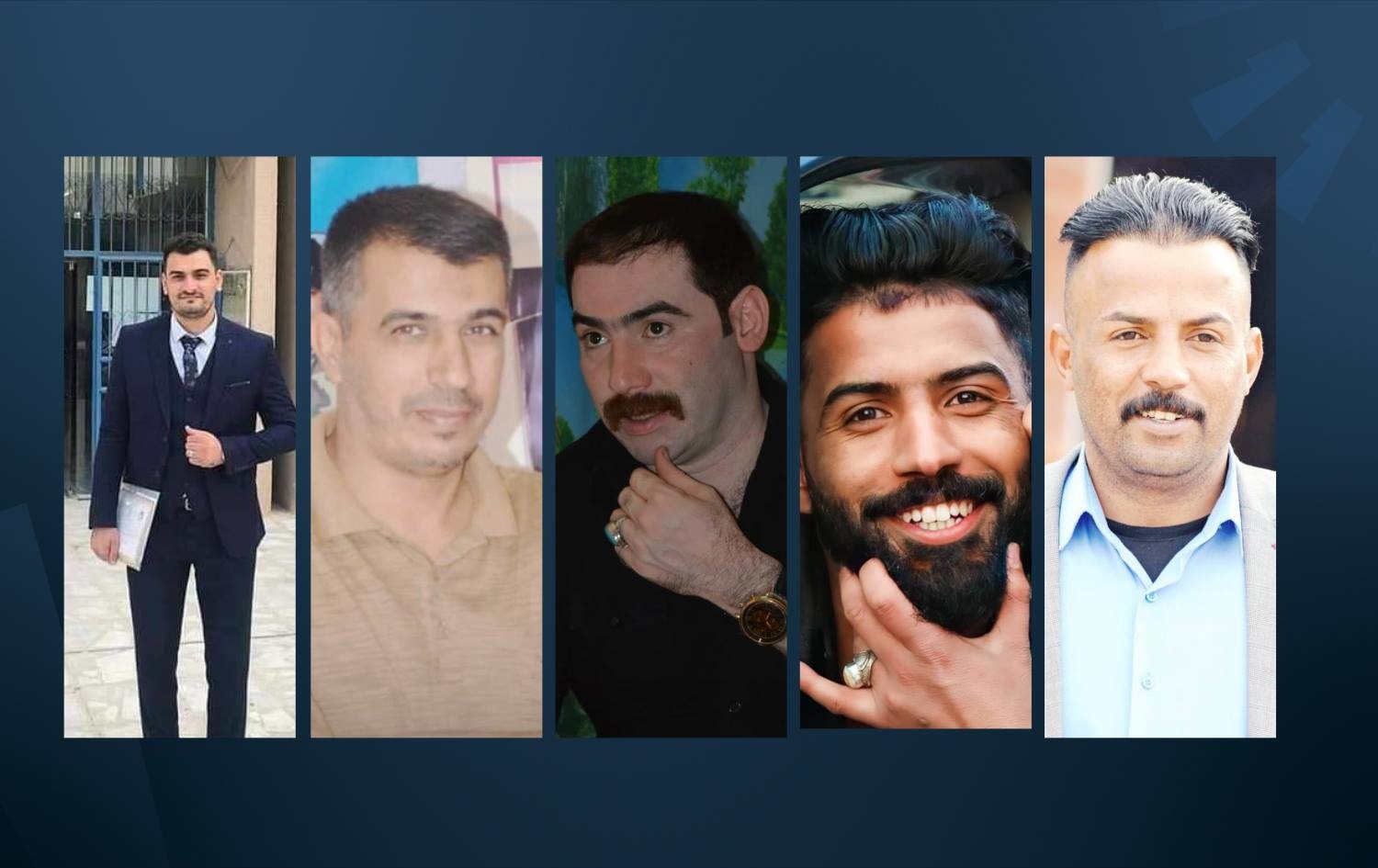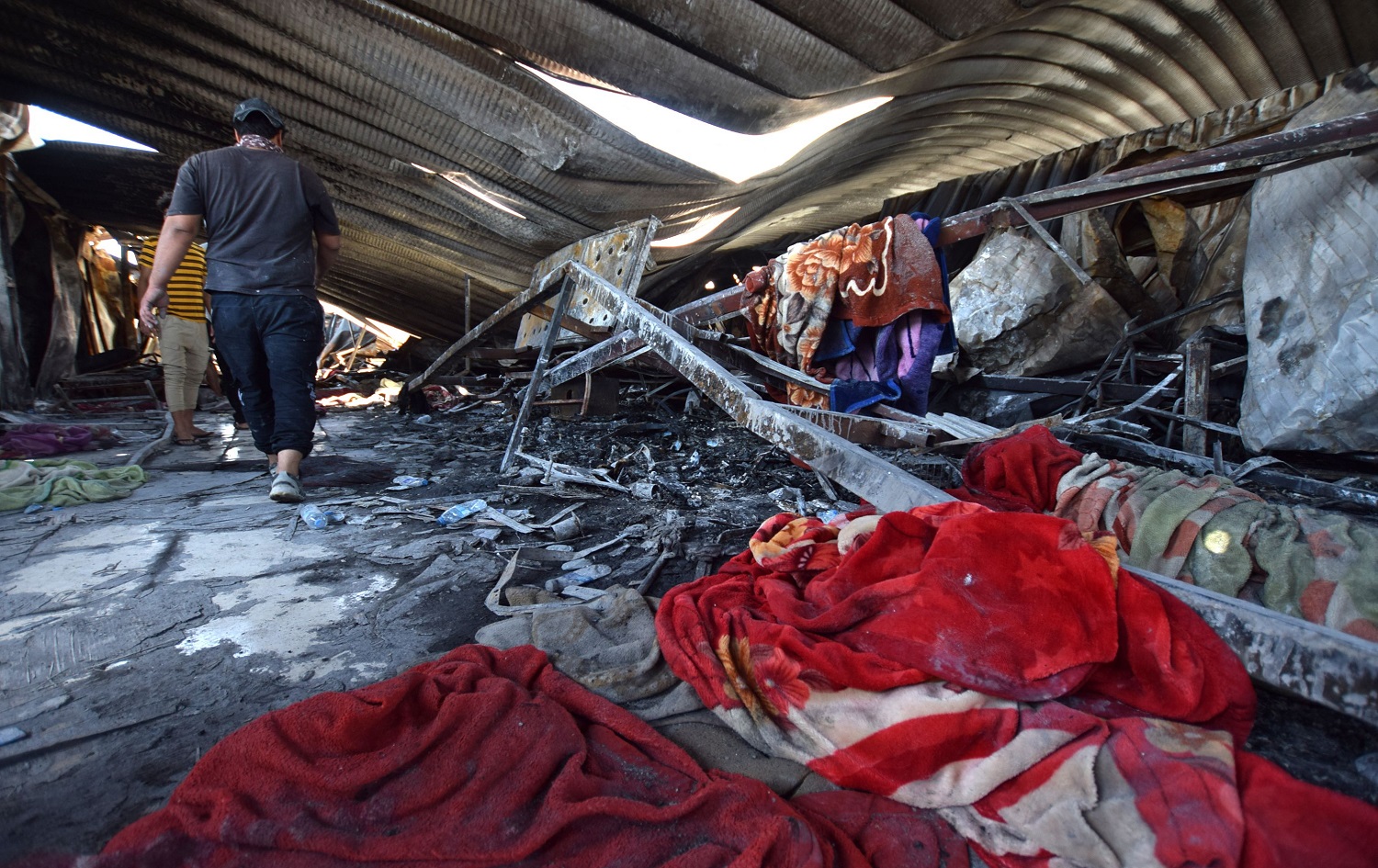ERBIL, Kurdistan Region — “I was walking among people, going right up in their faces and asking, ‘What happened?’ No one replied. I kept walking and watching the half-charred ground. I heard screams, wailing, ambulance. I was in shock. My mind could not process the horrifying scene.”
In a calm voice tinged with sorrow, Marwan Kadhim, 21, recounted snippets he could remember of the night fire ripped through a hospital ward for coronavirus patients in Nasiriyah, southern Iraq on July 12. Sixty people were killed in the fire at al-Hussein hospital according to the health ministry, though provincial authorities put the death toll much higher. Seven of them were members of Marwan’s family.
The fire, on the heels of another deadly hospital blaze in Baghdad in April, has left the nation furious, raging at a political class and system that holds little regard for the lives of ordinary Iraqis.
The night of the fire began as a calm summer evening. At around 10:10 pm, Marwan was picking up some dinner for his relatives at the hospital. His grandmother, Ketbah Fajir, and his uncle, Salam Rashid Jasseb, were both diagnosed with coronavirus a week earlier. They had no idea that the hospital they entered to save their lives would become a death trap.
Marwan visited the hospital every evening to deliver dinner to his relatives. He had done that for a week and never expected that Monday night would be the last time.
At 10:30 pm, Marwan received a call from an uncle telling him that his uncle and grandmother had just passed away.
“I couldn’t actually believe what I heard. I thought my uncle was telling me that my grandmother and my uncle died because of corona. I had no idea about the fire so when I arrived there, I was in complete shock,” Marwan said.
“When I arrived at the hospital, I saw a huge fire for the first time in my life.”
Marwan had nine relatives at the hospital that night. His uncle, Alaa Resan, with his sister, his wife, and four of his cousins, were visiting the two patients. Only two of them survived the blaze. Alaa had stepped outside before the fire started, along with one of his cousins, Ahmed.

When the fire broke out, Alaa tried to save his wife and other family members. He ran into the raging fire, but his lungs filled with smoke and he passed out, Marwan said. Alaa is still sick from the smoke inhalation.
The fire was still burning when Marwan arrived. He called it the most difficult night of his life, as he wandered through the corpses, hearing the screams of the wounded and the families of the dead. He spent two hours in a state of confusion and horror, not knowing what to do before he recovered somewhat from the shock and started searching for his loved ones in nearby hospitals, hoping they might be among the injured.
"I searched five different hospitals and didn’t find any of them. I felt like I would never find them. Then I received a call from one of my relatives at two o'clock in the morning telling me to go to the morgue, hoping to find their bodies there. I was with my uncle Alaa at the time, who insisted on leaving the hospital and joining me,” he recalled.
A crowd was gathering in front of the morgue. One person was crying for his father, others stood in stunned silence, Marwan said before pausing for a moment. His voice trembled when he picked up the story again. "I recognized my grandmother by her braids and the henna painted on her feet. Alaa recognized his sister by the necklace she was wearing.”
They also identified the bodies of four other relatives.
One person was still missing, Alaa’s wife Ibtihal al-Rikabi, a young woman in her early thirties and a mother of four children, the youngest just five years old.
The family returned home in silence with six bodies. The next morning they went to the holy city of Najaf where six graves were dug next to the burial place of Marwan’s cousin, Ahmed Falih, 31, a member of the Popular Mobilization Forces (PMF) who was killed in an Islamic State (ISIS) ambush in the Hamrin mountains in June 2020.
The body of Ibtihal was not identified until Sunday by DNA testing.
What happened?
The fire was "caused by the failure to properly handle oxygen bottles,” said the province’s health directorate spokesperson Ammar al-Zamili.
Authorities acted swiftly. Iraq’s Supreme Judicial Council issued arrest warrants for 13 officials in Dhi Qar governorate’s health directorate. The head of the health department, Ahmed al-Tawell, resigned and Saad al-Majidi was immediately appointed as his successor.
Majidi was a candidate for the al-Fatih alliance in Nasiriyah, representing the Iranian-backed Badr organization in the 2018 elections. He had held the position of director general of the Dhi Qar Health Department from July 2020 until February this year, when he resigned reportedly because he was upset about irresponsible actions by people in his department.
Over the past year, including time when Majidi was at the health department, several coronavirus wards were constructed, among them the one at al-Hussein.
In June of last year, the Dhi Qar health department announced the opening of 50-bed Karvani hospital to treat people with coronavirus in Nasiriyah’s Shuyukh market. It was a gift from the "Islamic Resistance, Kataib Hezbollah." Several similar health centres were constructed by the Imam Hussein shrine.
In October 2020, in a video clip shared on his Facebook page, Majidi talked about the construction of a coronavirus isolation ward affiliated with the Shifa Center at al-Hussein Teaching Hospital in Nasiriyah, promising to build it within two months.
On June 29, 2021 another COVID-19 ward was opened beside al-Hussein hospital, built with the same sandwich panel construction method. Two weeks later, fire broke out.
The Ministry of Health and the governor of Dhi Qar suggested the fire may have been intentional. Survivors said that the emergency exit to the coronavirus ward was shut and locked a few minutes before the disaster, state media reported. The official results of the investigation have not yet been released.
‘A time bomb’
Engineer Hassanein Khalil told Rudaw English that the sandwich panel material used to build isolation and recovery rooms for coronavirus patients is of poor quality. The panels are two pieces of aluminum with a filling made of materials derived from petrochemicals. They insulate against sound, but not heat.
"These materials are very dangerous, especially in a hospital where many electrical devices are used, in addition to oxygen tanks. At temperatures exceeding fifty degrees in southern Iraq, these recovery rooms are considered a time bomb," Khalil said.
He has worked in several hospitals in Basra, Nasiriyah, and Baghdad where he observed the increasing use of secondary ceilings and wall coverings made of materials like plastic without following safety precautions or installing firefighting systems.
"The fire system does not cost more than $200 per floor and there are many private Iraqi companies that can implement it. I do not know the reason for the great neglect of the health sector in Iraq and making a mockery of people's lives," he said.

In the 1950s, Iraq began major development of its health care sector, financed from the state budget. In the 1960s, new, modern hospitals were built in cities. This development continued in the 1970s with more hospitals and health centers built, including in villages and rural areas, until the Iraqi health system became one of the best in the Middle East.
However, in the beginning of 1990s, the health sector entered a dark era as a result of international sanctions, which led to shortages of medicines and medical equipment. Death rates among children and women notably grew and the fragile health infrastructure could not accommodate a rapidly increasing population.
After the fall of Saddam Hussein in 2003, the ruling political class tried to develop the health system. However, it collapsed as a result of corruption, lack of political will, and the deteriorating security situation.
In 2008, the Ministry of Health signed a $750 million contract with the Turkish company Universal to build five hospitals in Babylon, Karbala, Maysan, Basra and Dhi Qar. Work on the facilities, however, stopped and started over the years because of the security situation and money problems.
Former Prime Minister Nuri al-Maliki opened the Turkish Hospital in Babylon on April 27, 2014, just three days before parliamentary elections. The hospital was not finished or ready to receive patients and it was closed after the vote. It reopened in 2016.
Current Prime Minister Mustafa al-Kadhimi opened the Turkish Hospital in Nasiriyah in June and it began receiving patients in July.
Under pressure from protests, the Turkish Hospital in Karbala was opened last week and began receiving patients on Thursday. The hospitals in Maysan and Basra have not opened yet.
‘The tragedy will happen again’
Al-Hussein was not the first deadly hospital fire this year and people fear it won’t be the last.
Two and a half months earlier, a fire in Ibn al-Khatib Hospital in Baghdad killed around 130 people and injured many others. Rudaw English interviewed Murtadha al-Musawy, who lost three family members in the blaze and he was still looking for their blackened bodies.
"People around me were screaming and running. I could not believe the scene," Murtadha said in April, telling his story as he rushed through al-Kindi hospital, stepping over the injured and dead splayed on the floor. He searched the faces of burned bodies, hoping desperately that his loved ones were not among them.
He found their charred remains three weeks later, identifying his family members through DNA testing.
A report released following a fact-finding mission by the government-funded Iraqi High Commission for Human Rights (IHCHR) found that the Ibn al-Khatib fire started after an oxygen cylinder exploded in a patient wing crowded with visitors. The simplest safety standards did not exist in the hospital. There was no sprinkler system and fire extinguishers were not properly stored or located.
The Parliamentary Health and Safety Committee issued statements listing measures that should be taken to prevent a recurrence of the Ibn al-Khatib tragedy, including providing fire extinguishers and fire-fighting systems in hospitals and preventing crowded visitors in isolation wards. But after the al-Hussein fire, these measures seem to be nothing more than ink on paper.
“Our stories are similar, we the Iraqis, the poor Iraqis that no one cares about. The tragedy will happen tomorrow again, then next month, then next year. It won’t stop,” Murtadha said on Thursday.
Cover photo: People place fake coffins in front of the burnt coronavirus isolation ward of al-Hussein hospital in Nasiriyah on July 15, 2021. Credit: Asaad Niazi/AFP



